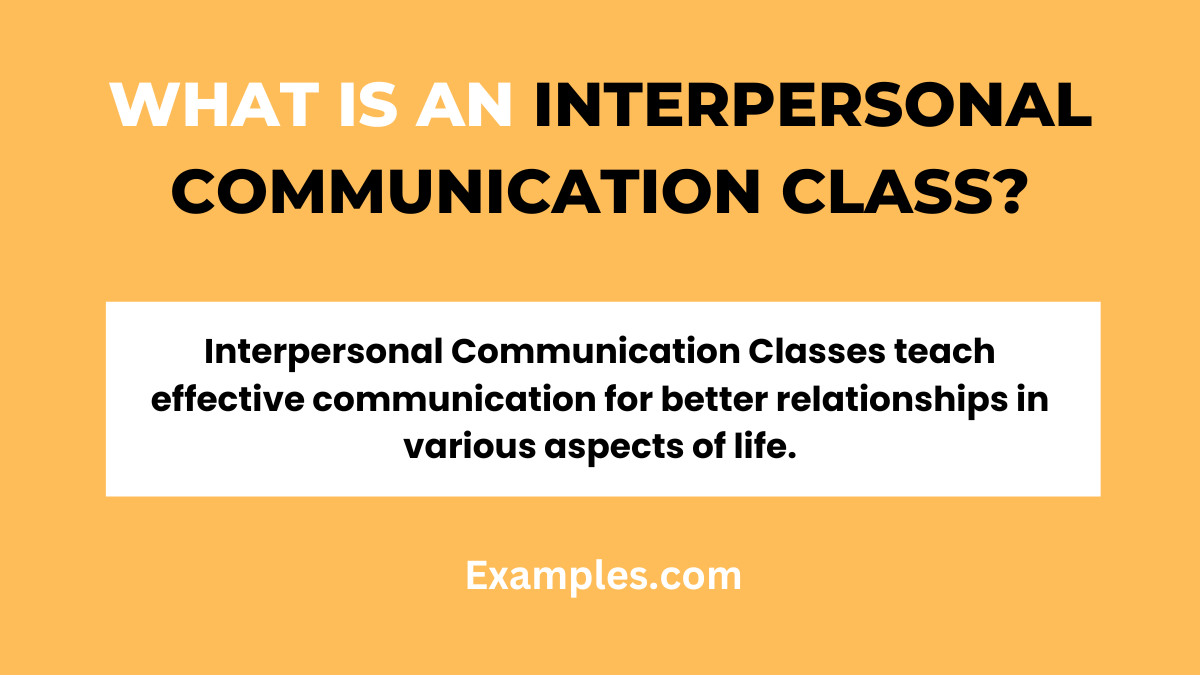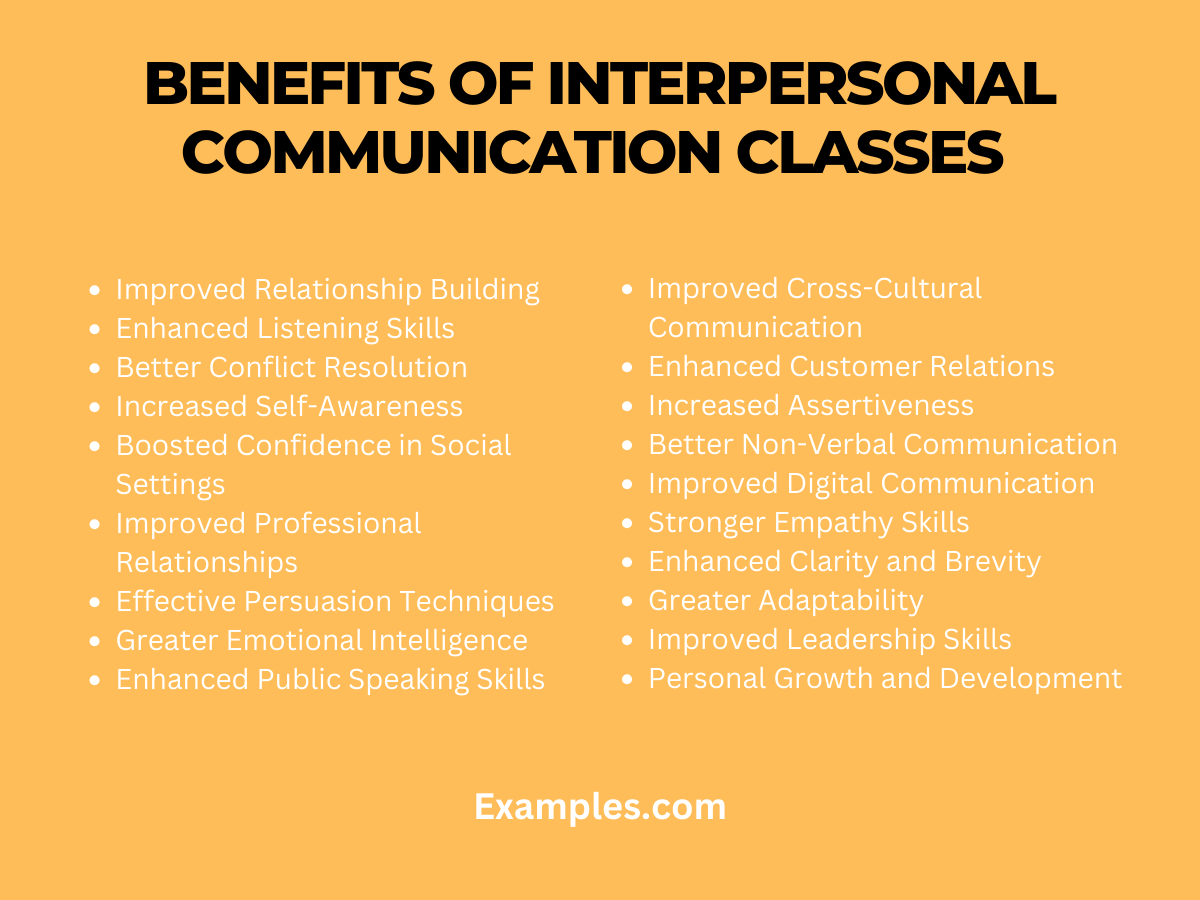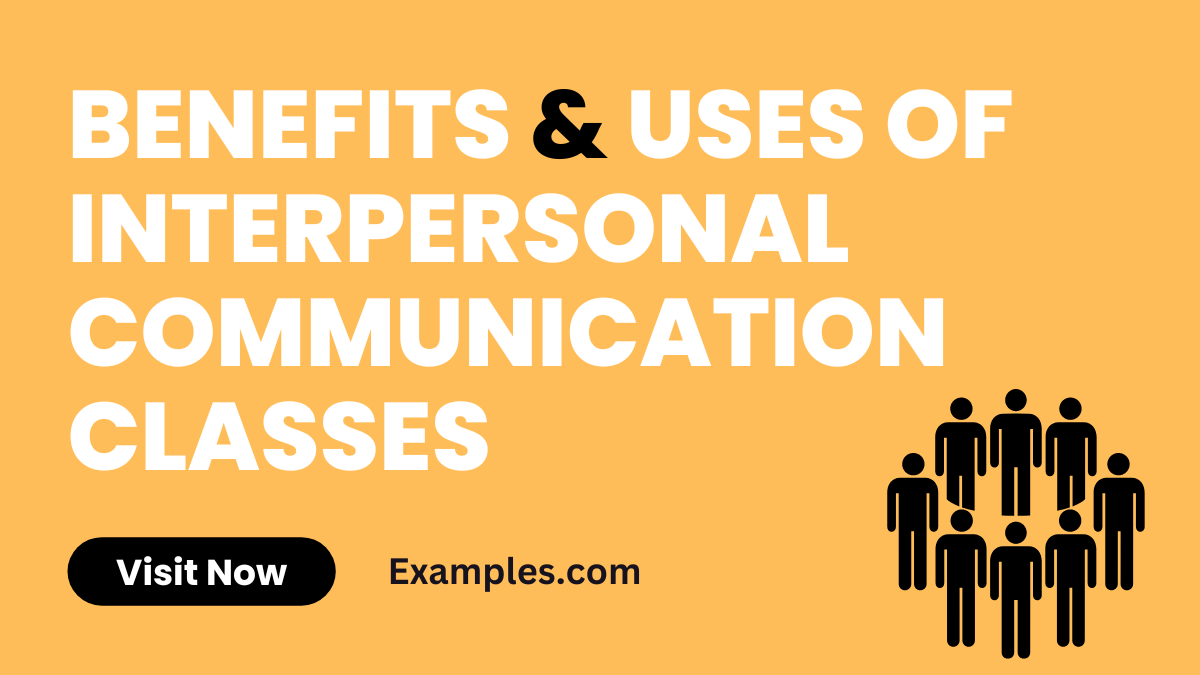19+ Benefits & Uses of Interpersonal Communication Classes Examples
Explore the dynamic world of interpersonal communication with our comprehensive guide. Delve into a range of communication examples that showcase the transformative power of effective interpersonal skills. These classes are not just about talking; they’re a journey through understanding verbal and non-verbal cues, enhancing emotional intelligence, and mastering the art of persuasion. Perfect for anyone looking to improve their personal and professional relationships, these classes offer practical, real-world applications. From resolving conflicts to building stronger bonds, the benefits are endless. Join us to unlock your communication potential!
What is an Interpersonal Communication Class?

An Interpersonal Communication Class is a type of educational course focused on teaching individuals how to effectively communicate and interact with others. It covers various forms of communication, such as verbal, non-verbal, and digital. In these classes, students learn skills like active listening, expressing themselves clearly, understanding others’ perspectives, and managing conflicts in a positive way. The aim is to improve how we connect and communicate with people in our daily lives, whether in personal relationships, at work, or in social settings. These classes are beneficial for enhancing personal and professional interactions, building stronger relationships, and fostering a deeper understanding of communication dynamics.
20 Benefits of Interpersonal Communication Classes Examples

Interpersonal communication classes offer invaluable tools for enhancing personal and professional relationships. By exploring elements of interpersonal communication, these classes enable individuals to express themselves more effectively, understand others better, and manage conflicts constructively. Ideal for anyone aiming to improve their communication skills, these classes are a treasure trove of practical strategies and insights.
- Improved Relationship Building: Learn to establish deeper connections with others.
Example: “I appreciate your perspective. Can you tell me more about it?” - Enhanced Listening Skills: Develop the ability to actively and empathically listen.
Example: “I hear what you’re saying and understand how important it is to you.” - Better Conflict Resolution: Acquire skills to handle disagreements constructively.
Example: “Let’s find a solution that works for both of us.” - Increased Self-Awareness: Understand your own communication style and its impact.
Example: “I realize I sometimes interrupt. I’ll work on listening more attentively.” - Boosted Confidence in Social Settings: Gain confidence to communicate in various social scenarios.
Example: “I feel more comfortable starting conversations at networking events now.” - Improved Professional Relationships: Enhance workplace communication and teamwork.
Example: “I’ve learned to provide constructive feedback to my team effectively.” - Effective Persuasion Techniques: Master the art of persuasion and influence.
Example: “By presenting my ideas clearly, I can persuade others more effectively.” - Greater Emotional Intelligence: Increase the ability to understand and manage emotions.
Example: “I now recognize and respond to emotional cues in conversations.” - Enhanced Public Speaking Skills: Build confidence in speaking to groups.
Example: “I’ve become more effective at presenting my ideas in meetings.”

- Better Negotiation Skills: Learn techniques for successful negotiations.
Example: “I negotiate by finding common ground and mutual benefits.” - Improved Cross-Cultural Communication: Understand and respect cultural differences.
Example: “I’m more aware of cultural sensitivities when communicating with international clients.” - Enhanced Customer Relations: Improve interactions with clients and customers.
Example: “I handle customer queries with more empathy and effectiveness.” - Increased Assertiveness: Communicate your needs and boundaries clearly.
Example: “I express my opinions confidently without being aggressive.” - Better Non-Verbal Communication: Understand the impact of body language and tone.
Example: “I’ve learned to read non-verbal cues like facial expressions and gestures.” - Improved Digital Communication: Navigate online communication platforms effectively.
Example: “I communicate more clearly in emails and social media.” - Stronger Empathy Skills: Develop the ability to empathize with others’ perspectives.
Example: “I strive to understand where others are coming from in discussions.” - Enhanced Clarity and Brevity: Learn to convey messages succinctly and clearly.
Example: “I’ve learned to be more concise and to the point in my communication.” - Greater Adaptability: Adapt communication styles to different situations.
Example: “I adjust my communication style based on the context and audience.” - Improved Leadership Skills: Enhance leadership capabilities through effective communication.
Example: “As a leader, I’ve learned to communicate vision and goals more effectively.”

- Personal Growth and Development: Foster overall personal growth through better communication.
Example: “Improving my communication has helped me grow personally and professionally.”
Interpersonal communication classes offer a wealth of benefits and uses, crucial for personal and professional growth. They equip individuals with essential skills for effective interaction, conflict resolution, and relationship building. This guide and the provided tips serve as a roadmap to mastering these skills, enhancing one’s ability to navigate diverse communication challenges with confidence and ease.



